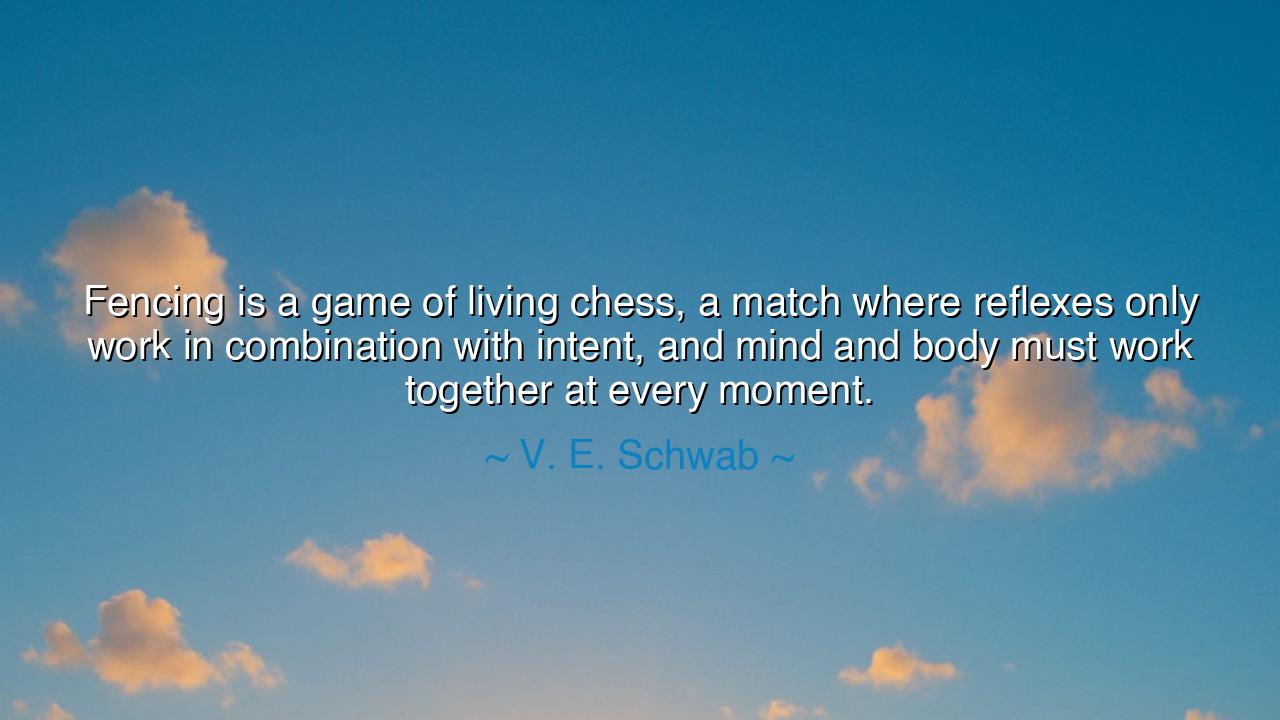
Fencing is a game of living chess, a match where reflexes only
Fencing is a game of living chess, a match where reflexes only work in combination with intent, and mind and body must work together at every moment.






The words of V. E. Schwab, “Fencing is a game of living chess, a match where reflexes only work in combination with intent, and mind and body must work together at every moment,” reveal the eternal union of strategy and instinct. In them shines the truth that victory is never the child of speed alone, nor of cunning by itself, but of harmony between thought and action. To step into the duel is to step into a sacred dance, where each movement is both planned and spontaneous, both calculated and alive.
At the heart of this saying lies the image of fencing as living chess. Just as the master of chess sees not only the move at hand but the future unfolding beyond it, so too must the fencer foresee the strike, the counter, the rhythm of the blade. Yet foresight alone is nothing without the sharpness of reflexes, the swift body that answers in the instant. Thus, Schwab reminds us that true mastery arises when foresight and speed serve one another.
The origin of these words flows from Schwab’s own insight as both storyteller and practitioner of thought. By likening the duel to chess, she places it among the great arts of the mind; by insisting on the unity of mind and body, she shows that the contest is not mere sport, but a metaphor for the struggles of life itself. For in all battles—whether with blade or with fate—neither the body alone nor the spirit alone can prevail; both must act as one.
Let this wisdom endure: in the duel of existence, as in fencing, victory belongs to those who wed intent to action, who bind mind to body without division. The hand that strikes without thought is reckless; the thought that plans without motion is powerless. But when the two flow together, every step, every breath, every strike becomes destiny itself. Thus Schwab’s words are not merely about blades, but about life—teaching us that harmony within ourselves is the greatest weapon of all.






LTLinh Le Thuy
Fencing being described as 'living chess' caught my attention. It makes me wonder, do the best fencers think several moves ahead like a chess player does, or is it more about reacting in the moment? What kind of mental exercises could one practice off the field to sharpen this kind of strategic thinking and reaction time? How do you prepare mentally for the intensity of such a sport?
MQNguyen Mai Quyen
The idea of fencing being a combination of mind and body really resonates with me. It makes me curious about how other martial arts or competitive sports might be similar in this way. How important is mental focus when it comes to reflex-driven activities, and are there techniques to improve that aspect? Does this balance between mental and physical effort come naturally, or is it something that has to be consciously developed over time?
HNHuong Nguyen
I’ve always thought of fencing as just a sport of quick movements, but this quote brings a deeper perspective to it. It’s like chess, where every move counts, and one wrong decision could lead to defeat. I wonder, how does one learn to balance reflexes with intention? Is this something that can only come with experience, or can someone new to the sport learn to develop this balance quickly through focused practice?
GDGold D.dragon
This quote makes me think about how much mental concentration and strategy are involved in fencing. It's not just about the speed or reflexes; it’s about how quickly your mind processes the next move, even before your body can react. How do athletes train their mind to sync with their physical abilities so perfectly in such a fast-paced environment? Can that mental training be applied to other aspects of life, like decision-making in business or personal challenges?